Stay ahead of the curve as a political insider with deep policy analysis, daily briefings and policy-shaping tools.
Request a DemoPROFILE: GA Supreme Court Chief Justice Michael Patrick Boggs
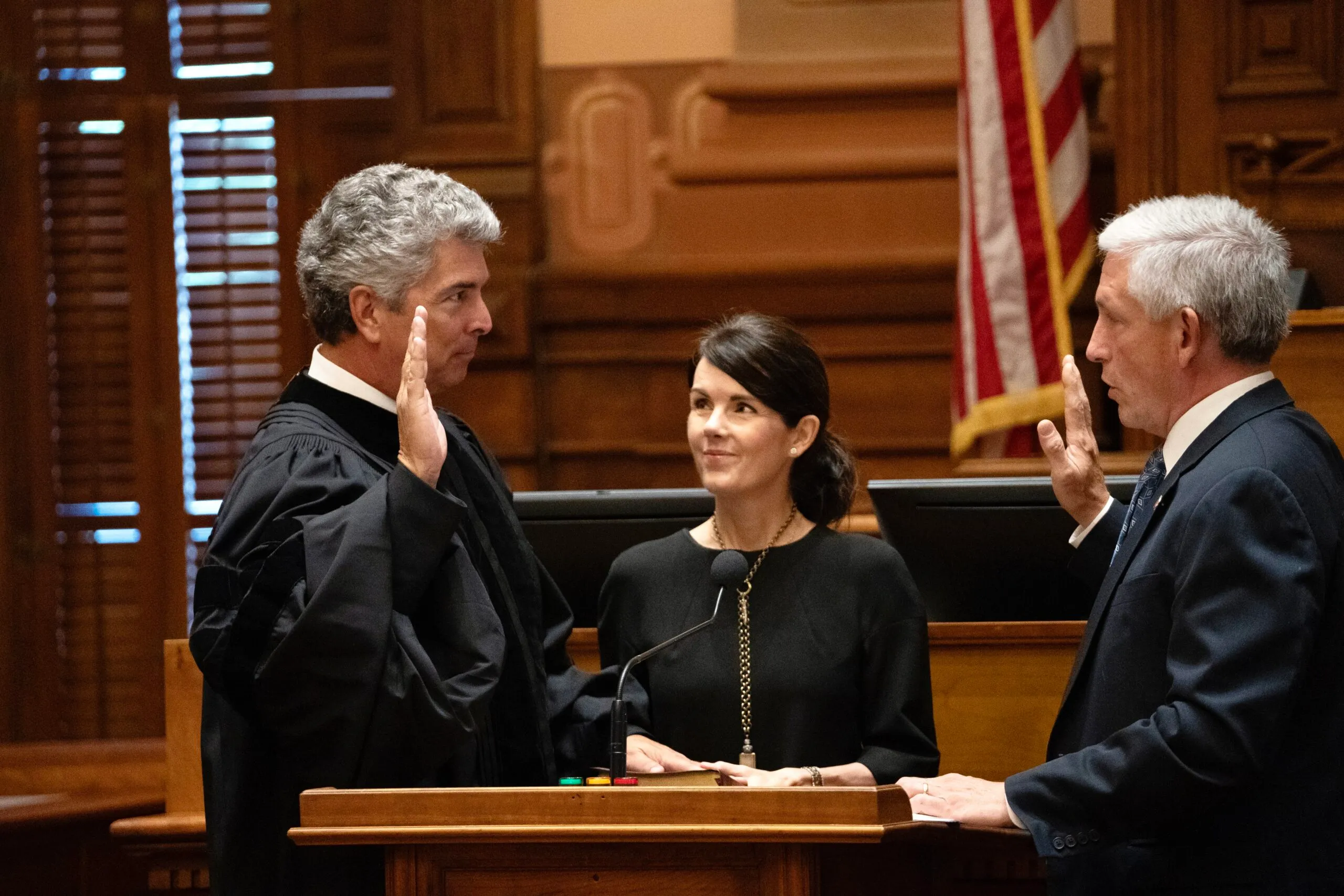
Honorable David E Nahmias (right) administers oath of office to Michael P. Boggs while his wife Heather Boggs holds the Bible on July 18, 2022.
Boggs on what it means to be elected the state’s top judge, his father’s influence, and saltwater fishing
The irony hasn’t escaped Mike Boggs.
The new chief justice of Georgia’s highest court sits in a well-appointed judge’s chambers five floors up in the Atlanta building that bears the name of the man who appointed him to the Supreme Court of Georgia six years ago.
“I never aspired to be a judge at any level. So yeah, it’s somewhat surprising to myself that I would be here,” Boggs, 59, said. ”I think it’s fitting that it’s named after [former] Gov. [Nathan] Deal. The contributions he made to the judiciary in general are significant.”
It’s also no small feat that Bogg’s Supreme Court peers elected him to head one of the busiest state supreme courts in the nation at one of the most challenging times for Georgia’s judicial system.
“One of the largest issues he’ll be dealing with is the process by which the courts continue to dig out of the case backlog created by COVID,” said Harold Melton, who tackled the mountainous COVID backlog of cases during his tenure as chief justice from 2018 to 2021.
“It was big when I left. It’s less but it’s still big. It’s still a challenge,” said Melton, now with the Atlanta law firm of Troutman Pepper.
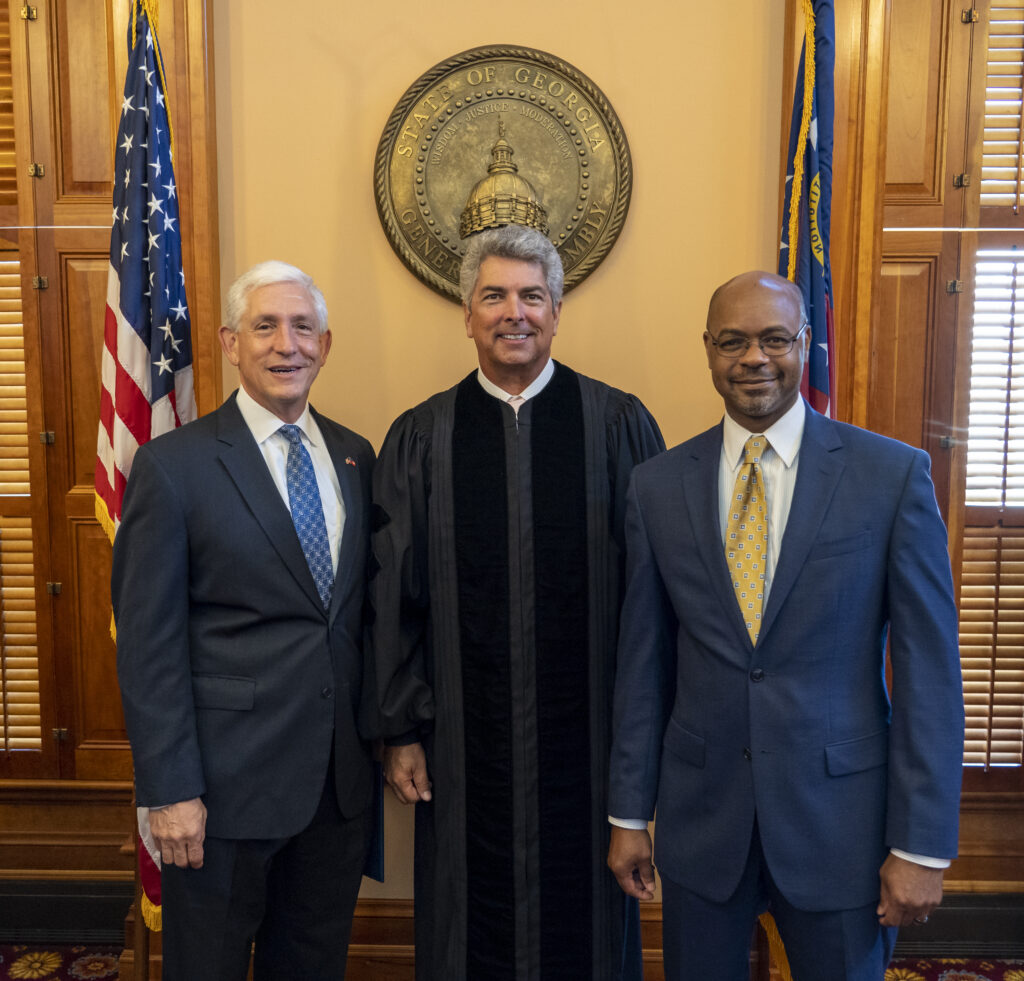
Last year Gov. Brian Kemp designated about $96 million in federal American Rescue Plan Act (ARPA) money to deal with backlogs of court cases, particularly serious, violent felonies. Boggs heads the committee that oversees applications from courts around the state for the ARPA funds and helps determine the awarding of those funds.
Now in its second year, the committee has awarded grants to 42 of the 50 judicial circuits in Georgia, totaling more than $44 million.
Requests from judicial circuits have included funding for temporary personnel, including senior judges, assistant district attorneys, security personnel, and court reporters, as well as funding for rental of temporary spaces to hold court.
Those who know Boggs say he is a data-driven expert who is intelligent, hardworking, humble and has a deft human touch and deep concern about criminal justice reform. Early in his legal career, Boggs founded the Waycross Judicial Circuit Drug Court program and served as a member of the Judicial Council of Georgia’s Standing Committee on Accountability Courts. Accountability courts work with people convicted of nonviolent crimes via counseling, rehabilitation programs and community service work to avoid jail time.
“He is the perfect person to lead us into this next chapter of the Georgia State Judiciary,” said Stephen Dillard, a presiding judge for the Georgia Court of Appeals. The two have known each other for more than 20 years, developing a close working relationship and friendship from their days together on the state appeals court.
Dillard said Boggs assumes Georgia’s top judicial job “without any agenda.” The job is non-partisan and as the highest-ranking judicial officer in Georgia, Boggs will be serving on various commissions.
“He just wants to get it right,” Dillard said. “He understands that the role of a judge is not to make policy but to interpret the law. With everything he’s done in the area of criminal justice reform, I don’t know anyone in the United States that is more dedicated to criminal justice reform than Chief Justice Boggs.”
Boggs is the 35th chief justice to head the Supreme Court of Georgia since its creation in 1845.
In one of his first interviews since being sworn in on July 18, Boggs spoke Wednesday with State Affairs Senior Reporter Tammy Joyner. The conversation has been edited for clarity and length.
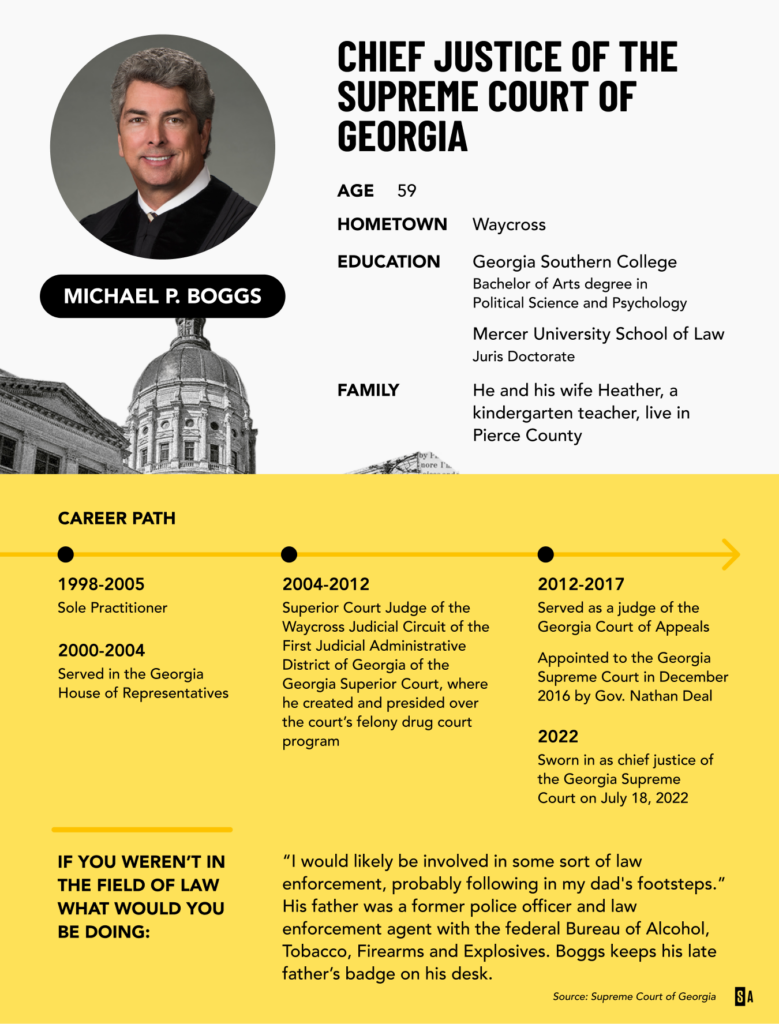
What motivated you to go into law?
I’m a first-generation, four-year college graduate. Neither of my parents graduated from [a four-year] college. My dad had a two-year degree and was a police officer. My interest probably stemmed from my curiosity and interest in the work my dad did. He was a police officer who ultimately became a federal law enforcement agent, which is what brought my family to Georgia when I was 3-years-old. He was transferred here with the Bureau of Alcohol, Tobacco and Firearms. When I went to law school, my goal was to go into federal law enforcement. I had an interest in going into the FBI.
My brother just retired from the Drug Enforcement Administration. So he followed in my dad’s footsteps and being the youngest, I had an interest in that as well. But between my junior and senior year in college, my father died unexpectedly of cancer. He was 47-years-old. That changed everything for me and my career path. So I worked in Congress for two years for J. Roy Rowlands, our 8th District Georgia Congressman at that time. Working in Congress as a legislative aide to a congressman really piqued my interest even more so in law school. It became less about going into federal law enforcement and more about being in public service.
What do everyday Georgians need to know about the Georgia Supreme Court? How is it different from the U.S. Supreme Court?
The courts are similar in a number of respects. The types of cases we hear and the finality of much of what we decide are very similar. There are nine justices on both courts. But that’s about the end of the similarities.
The differences are pretty significant. The average citizen should understand that we’re a third branch of government. We’re not a state agency. The judicial branch is a co-equal branch of government. We have certain prescriptions on the types of work we do – guardrails if you will – on how we do our job. We are nonpartisan.
The public, from time to time, is confused because judges are elected and they expect judges to be held accountable and to be responsive to public clamor or public criticism in the same way that other elected officials are in the legislative or executive branch.
That’s not the role of the judicial branch. The judicial branch is not to make the law but rather to interpret the law. So our court is different in a number of respects. There are judges in the United States – as close as Alabama or Texas – at my court level that are partisan justices. We don’t run partisan.
The significance of our court is that, unlike the U.S. Supreme Court, we have time limits on when we must decide cases. Our volume is substantially greater than what the U.S. Supreme Court deals with. Each of those justices might write eight opinions a year. Our justices could write anywhere from 40 to 50 opinions a year per judge. The volume is substantially greater than probably any other [state] High Court in the country and certainly higher than the Supreme Court of the United States.
Why is Georgia’s volume so high?
We’re a litigious state I guess is one reason. We’re also a sizable state. Georgia’s population is well over 11.5 million people now and we have probably over 50,000 lawyers. Our volume is largely dependent on our jurisdiction, and our jurisdiction changed in 2016. We have a fairly narrow jurisdiction at the Supreme Court of Georgia. We have been viewed by objective studies – one in 2008 by University of Chicago and one by I think the Massachusetts Supreme Court – that demonstrated that we were the busiest High Court in the nation, and most efficient. In addition, we have to do our job and dispose of cases within a period of two terms of court, that’s about seven months. Most High Courts don’t have that constitutional provision that requires finality and disposition within a certain period of time.
How do you view your role as chief justice?
The Chief Justice has a considerable number of administrative responsibilities. Those responsibilities include chairing the Judicial Council of Georgia, which is the body of all of the officers of the various classes of courts in Georgia.
I view that role very seriously because you have an obligation to try to assist the lower-class courts with whatever they need, whether it be through supporting legislative changes that improve the administration of justice, or whether it be through budgetary appropriations to ensure they have the resources necessary to move their dockets.
The chief justice doesn’t get a break on cases. I have all of these administrative responsibilities in addition to all of the cases.
The chief justice is really the head of the state judicial branch. It’s not something I take lightly. My goal is to ensure that all of these courts have the resources they need, and that they’re able to move the cases. COVID changed a lot of that and made it a little bit more difficult and challenging. My predecessors David Nahmias and Harold Melton confronted those issues head on when it [the pandemic] first hit in 2020 and did a remarkably good job, in my opinion, in managing to give guidance to our lower courts about how to dispose of cases. So, my job is to try to assist these courts.
Judges aren’t policy makers. But we do have a limited role by virtue of our experience and our expertise in helping policymakers shape policy that would help the administration of justice. It’s one of the few areas of policymaking where judges are able to dip their toe in the water and assist the legislature to the extent they want to change something.
How will the state Supreme Court be different under your leadership?
It’s not my goal for it to be different. My goal is to provide the same sort of consistent steady guidance that I have seen my predecessors provide. We’ve had terrific leadership as long as I’ve been on this court and even prior. These chief justices have done a remarkable job and under really difficult circumstances. So, I don’t intend to try to change anything.
Is there one particular lesson you’ve learned while on the bench that you will use to guide you as Chief Justice?
Probably the greatest attribute of any judge is the ability to listen. It’s a trait I’ve tried to formulate over time. Listening to the needs of these courts. I want all of our courts to speak with one voice and I’m currently that voice. But in order to appreciate that role, I have to understand the needs of all these respective classes of courts. Listening to them and trying to assist them as needed is going to be a very important aspect of my job. I think any judge aspires to do a good job and part of that [involves] being fully informed and making decisions based on good data. So that’s my goal.
Are there still remnants of the impact of COVID on Georgia’s judicial system?
Most assuredly. There are backlogs of cases that have built up. On the criminal side, our trial courts were unable to convene grand juries and bring back indictments. Then law enforcement was a little slower in executing arrest warrants because of COVID and problems bringing folks into the county jails. So all of that has manifested itself into a situation where most of our trial courts or lower trial courts, predominantly our superior courts, have significant backlogs that we’re helping them work through. Every class of court was significantly impacted by COVID.
Do you have a sense of how long it may take to resolve the backlogs?
Our resources we have available as allocated by the governor will go through calendar year ‘24. So we will have the resources necessary to help our courts but there are always backlogs; that’s just the nature of the judicial system. There are always going to be backlogs of cases. The question is are these backlogs any different than the backlogs that existed prior? Have they been exacerbated or are they more significant. We’ve seen that they are. I don’t know what timeline it will take to remediate those backlogs.
Once those backlogs are addressed by our trial courts, then the problem will shift because then the appeals will start coming from all of those cases. So we know the tsunami is coming for both the Court of Appeals and the Supreme Court. We’re trying to get ready for that.
What are some of the top cases expected to come before the Georgia Supreme Court soon?
I don’t predict that. We don’t invite cases to this court. We will take whatever shows up.
What issues are you most passionate about and hope to address as chief justice?
I’m driven to ensure that public perception of the judiciary is improved and that the public has a firm and clear understanding of our role, our duty, and the limited nature of our job.
I’m very passionate about ensuring that the judiciary remains independent and is allowed to do its job as constitutionally obligated. I’m very passionate about the rule of law and making sure that we don’t become just another responsive, reactionary body that is subject to political whim or public clamor. Instead, the independence of the judiciary is upheld.
It’s important to me to improve the administration of justice. My career has been largely dedicated to giving myself and other judges tools to use to try to help people, not because I view the job of a judge as that of a social worker. I view the job of judge as a humanitarian and someone who is interested in and able to assist other people but also improve the process.
Given the recent Roe v Wade decision and Georgia’s heartbeat bill do you expect to see some cases end up in the state Supreme Court?
I don’t have any response whatsoever to that. We decide cases when they show up. If they’re within our jurisdiction, we’ll keep them and we’ll decide them in due order. If they’re not, we’ll transfer them.
What’s your guilty pleasure?
I don’t know that I have a guilty pleasure. I have recreational outlets. One of the things I really enjoy is saltwater fishing. I’m a backwater saltwater fisherman. That’s how I unwind.
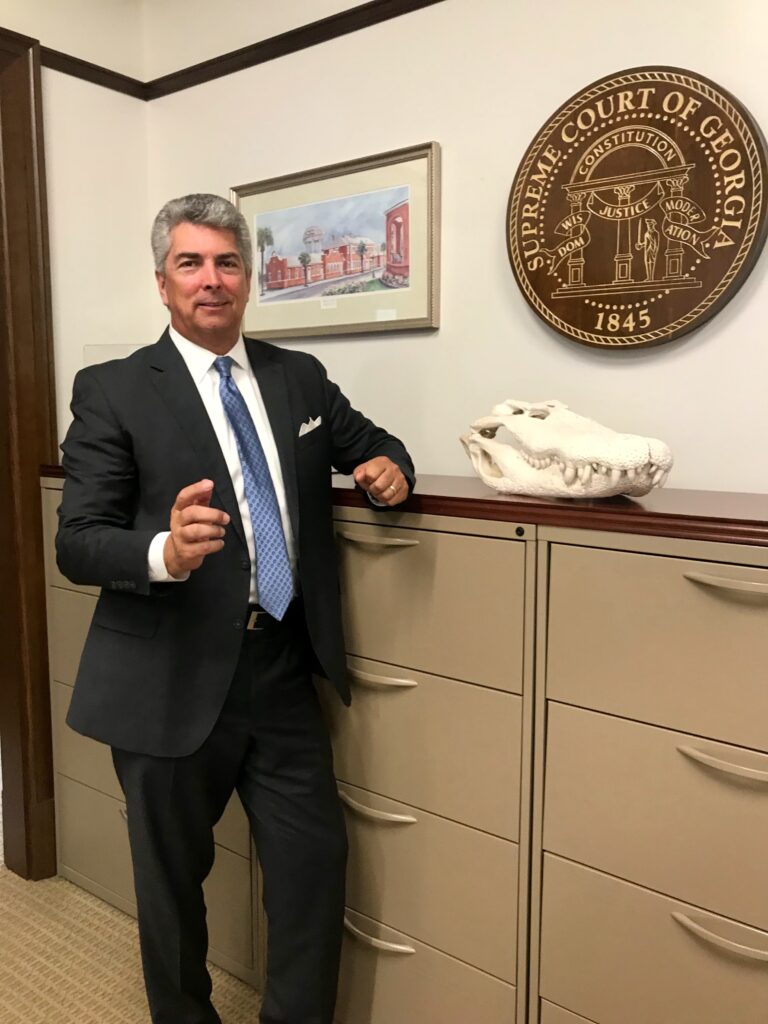
Final question: What should every visitor to Georgia eat while they’re here?
Well, that’s easy. You’ve got to have barbecue, right?
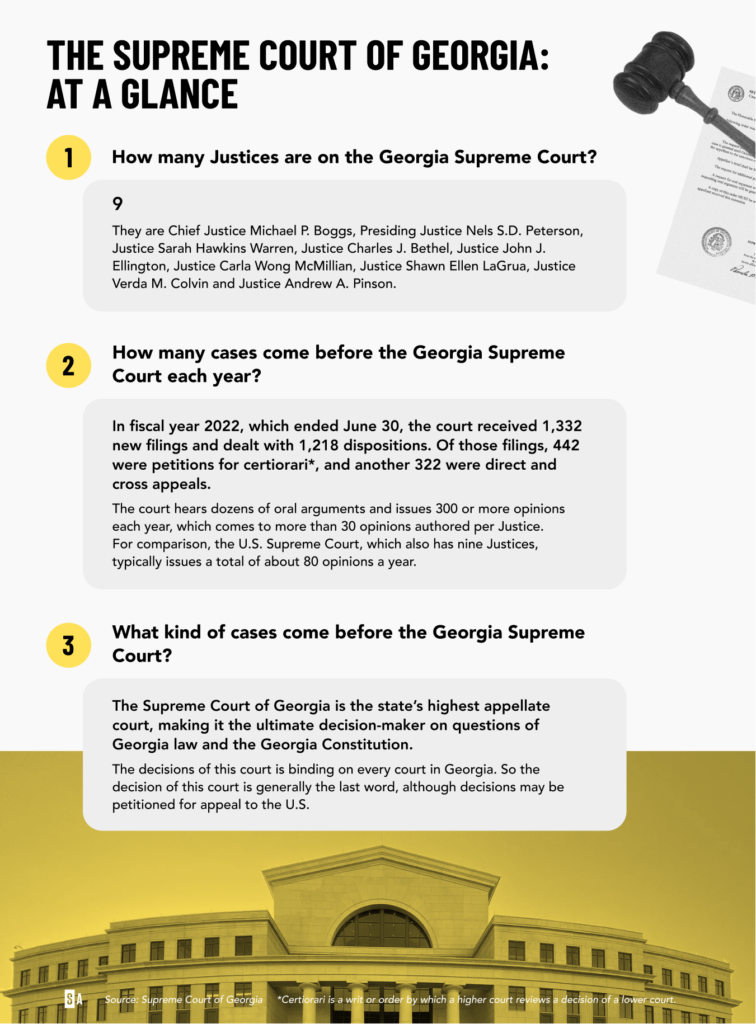
Join the Conversation
Who do you want us to profile next? What else do you want to know about state government in Georgia? Share your thoughts/tips by emailing [email protected] or on Twitter @LVJOYNER.
Header photo: The Honorable David E. Nahmias (right) administers the Oath of Office to Michael P. Boggs as his wife Heather Boggs holds the Bible in the House Chamber at the State Capitol on July 18, 2022. (Credit: Bruce Shaw, AOC/Judicial Council of Georgia)
Professionals still face licensing delays amid state’s transition to online system
The Gist Georgia’s professionals and business owners are still struggling to obtain professional licenses in a timely manner. As the Secretary of State’s Office rolls out its new Georgia Online Application Licensing System to expedite the process, the efficiency of this new process is being put to the test. What’s Happening Thursday morning at the …
Controversy over AP African American Studies class grows
Rashad Brown has been teaching Advanced Placement African American Studies at Atlanta’s Maynard Jackson High School for three years. He’ll continue to do so — even though the state’s top education official removed it from the list of state-funded course offerings for the upcoming school year. While Brown prepares to start teaching his class on …
Students, teachers, lawmakers blast decision to end AP African American history classes
ATLANTA — A coalition of lawmakers, civil rights leaders, clergy, educators and students Wednesday called on the state’s education czar to rescind his decision to drop an advanced placement African American studies class from the state’s curriculum for the upcoming school year. “This decision is the latest attack in a long-running GOP assault on Georgia’s …
Kamala Harris’ presidential bid reinvigorates Georgia Democrats
Georgia Democrats have gained new momentum heading into the November election, propelled by President Joe Biden’s decision to bow out of his reelection bid and hand the reins to Vice President Kamala Harris. The historic decision, announced Sunday, is expected to prove pivotal in the national and state political arenas and breathe new life and …




